This week, we’re considering the political implications of Florida Governor Ron DeSantis (R.) passing another pro-gun bill.
He signed a bill barring banks from dropping accounts or lines of credit because a person lawfully owns a gun or runs a gun business. This comes after he repealed permitting requirements for law-abiding adults over 21 to carry a concealed firearm.
That is a remarkable turnaround from the post-Parkland effort to add new restrictions. It also puts DeSantis ahead of Donald Trump, his leading potential opponent in the Republican primary, in the realm of legislative gun reforms. I explain the opening DeSantis might be able to exploit. “Might” being the keyword.
Contributing Writer Jake Fogleman looks closely at gun policy in a state that has moved in the opposite direction: Colorado. Despite a decade of tightening gun laws, he finds that Colorado has only seen rising gun murder and suicide rates. Unfortunately, it doesn’t seem to have faired any better on mass shootings either.
Plus, Author Mark W. Smith joins the podcast to read the tea leaves of the latest Supreme Court move on an Illinois AR-15 ban.

Analysis: DeSantis Gun Policy Moves Exploit Trump Vulnerability [Member Exclusive]
By Stephen Gutowski
Florida Governor Ron DeSantis’s aggressive push for new pro-gun laws has set him up with an opportunity to outflank former president Donald Trump in the Republican presidential primary.
This week, DeSantis signed new regulations into law that prevent banks from denying loans and accounts to people for lawfully owning guns or operating gun businesses. It also bars banks that use social credit scores that factor gun ownership into lending decisions from doing business with the state government. It is the second major gun reform that DeSantis has signed into law this session.
Last month, DeSantis signed a bill eliminating permitting requirements for lawful adults over 21 to carry a concealed firearm. He made Florida the 25th state to do so and the second-largest behind Texas.
That is a remarkable turnaround for a state that had been tightening its gun laws just a few years prior in the wake of the Parkland school shooting. Florida had banned those under 21 from buying guns and instituted a “red flag” law, which temporarily seizes guns from those deemed to be a threat to themselves or others. And it came on the back of a Republican supermajority in both houses that has come into power since DeSantis became governor.
This sets up an obvious argument for DeSantis should he decide to run for president. His electability helped win him re-election by nearly 20 points and put Republicans in firm control of the levers of state government. That let him address the top priorities of the gun-rights movement and the gun industry.
Not only that, but he has not called for new gun restrictions of any kind since becoming governor.
These are all areas of significant contrast with his leading opponent Donald Trump. Trump lost the 2020 election, and losses by his top proteges cost Republicans Senate control in 2020 and 2022. He has few pro-gun legislative accomplishments to show from his time as president. And he not only endorsed stricter gun laws in the wake of the Parkland shooting–saying “take the guns first, go through due process second” in approval of “red flag” proposals–but unilaterally instituted the bump stock ban in the wake of the Las Vegas shooting. That ban has now been found unconstitutional by two federal appeals courts, including by judges Trump himself appointed.
Republican voters say these contrasts matter to them too. 66 percent of Republicans prefer a presidential candidate who “opposes any gun restrictions, according to a new CBS News/YouGov poll.” That’s second only to a candidate who “challenges woke ideas.”
All of this suggests there is an opening for DeSantis to the right of Trump on gun policy.
Of course, that doesn’t mean Trump is without a viable defense. He has consistently sought and received the support of the National Rifle Association. He signed a repeal of Obama-era regulations that sought to deny guns to some Social Security recipients. He declared gun ranges and stores essential businesses during the coronavirus pandemic.
He also has a trump card in that he appointed three of the Supreme Court justices who ruled in favor of instituting a new stricter test for the constitutionality of gun laws in 2022’s New York State Rifle and Pistol Association v. Bruen.
That CBS News poll also shows Trump running far ahead of a potential DeSantis candidacy. 58 percent said they’d vote for Trump if the election was held today to just 22 percent for DeSantis. The Florida governor gets to 52 percent when those considering voting for DeSantis. But Trump dominates here as well, with 76 percent considering voting for the former president.
But DeSantis hasn’t even announced his candidacy yet, and actual voting is very far off.
DeSantis also isn’t the only Republican governor with a similar track record of rolling back gun restrictions. In fact, Texas Governor Greg Abbott enacted both of the gun bills DeSantis did and several more before he did it. Georgia Governor Brian Kemp also passed permitless carry shortly before being re-elected in an increasingly purple state.
Still, Trump is vulnerable on gun policy, and there’s reason to believe DeSantis is well-positioned to exploit that.
Podcast: Examining the Supreme Court’s Renewed Interest in AR-15 Bans With Author Mark W. Smith [Member Early Access]
By Stephen Gutowski
The Supreme Court is back in the spotlight because it showed a sign it might soon act on so-called assault weapons bans.
But the sign comes in the form of a complex legal maneuver that needs some explaining. That’s why we have author and pro-gun lawyer Mark W. Smith on the show to suss out exactly what’s going on and what it means.
Justice Amy Coney Barrett, who oversees the Seventh Circuit, asked Naperville, Illinois, to defend its ban on AR-15s and similar firearms against an emergency request to block the law. Smith said that means she, and probably other members of the Court, may take the rare step of entering an emergency injunction. However, he said that likely depends on what happens with a sister case against Illinois’ statewide ban.
Smith argued the common defenses of the bans are lacking. He said the Heller standard that guns in “common use for lawful purposes” can’t be banned is the proper way to judge these cases. And he said it is clear AR-15s and the other firearms targetted by assault weapons bans are popular enough to be considered in “common use.”
We also talk about Smith’s new book Disarmed: What the Ukraine War Teaches Americans About the Right to Bear Arms. He explains why he thinks Ukraine made significant missteps in the lead-up to the Russian invasion by not arming civilians at large until just before hostilities broke out. But he argues Ukraine’s newly-armed populous has helped repel the invaders, just as America’s did several centuries ago.
Plus, Contributing Writer Jake Fogleman and I discuss the effects of Colorado’s decade-long push to tighten its gun laws.
You can listen to the full episode on your favorite podcasting app or by clicking here. Video of the show is also available on our YouTube channel. As always, Reload Members get early access to the show on Sunday. Everyone else can listen on Monday.
Come on the Podcast
One of the many perks of a Reload membership is the opportunity to appear on the podcast. We’ve had a lot of people on the show from all kinds of backgrounds. It’s one of my favorite segments since it gives us all a better insight into the community that makes this publication possible. If you want to come on the show, just reply to this email and let me know!
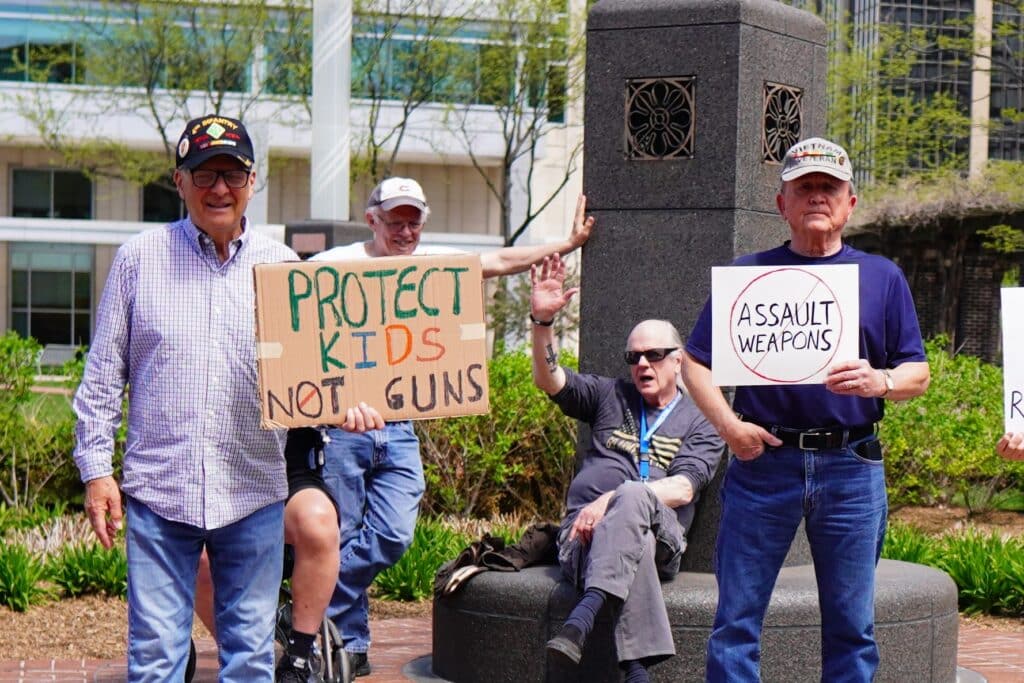
Analysis: Has a Decade of Colorado Tightening Its Gun Laws Worked? [Member Exclusive]
By Jake Fogleman
Colorado has again expanded its gun regulations, but how effective has the decade-long push for more restrictions been?
Governor Jared Polis (D.) signed a package of four new gun-control bills into law last Friday. The signed bills include new three-day waiting periods for all gun sales, an expansion of who can file for an Extreme Risk Protection Order, a total ban on gun sales to those under 21, and a repeal of the state’s gun industry liability shield against lawsuits for gun crimes committed by third parties.
“I was honored to sign these bills alongside the survivors of gun violence, advocates, and state lawmakers,” Governor Polis said. “Together, we are working to make Colorado one of the 10 safest states in the nation and address this challenge.”
A fifth bill that would ban the sale and possession of unserialized firearms and firearm components, referred to as “ghost guns” by advocates, has already cleared the state Senate and is expected to pass the House and get signed into law by Polis after the end of the legislative session next week. A sixth bill to allow county governments to ban shooting firearms on private property has also already cleared one chamber, though its path to the Governor’s desk before the end of the session is less certain.
The bills together mark one of the most significant legislative sessions in years, but they continue a recent trend in the state. Since 2013, the once-purple state has adopted fourteen new gun-control laws, mainly in response to high-profile mass shootings in Colorado. That has made the state an outlier in state-level gun policy over the last decade and is, therefore, one of the gun-control movement’s biggest political success stories.
“Colorado has many strong firearm laws and has made significant progress in its gun law strength in the years since the 2012 Aurora movie theater shooting,” the gun control group Everytown for Gun Safety said of the Centennial State on its website.
The group currently ranks the state 12th in the nation in terms of “gun law strength.” The gun-control group Giffords likewise gives Colorado high marks for its strict gun laws in the form of a “B” grade in its latest rankings (which does not include the four bills signed into law this session).
Given that the state’s turn towards stricter gun laws has often responded directly to mass shootings and other violent crimes, it’s worth evaluating how a decade of gun control has moved the needle on either front.
Colorado’s Decade of Gun Control
The state’s shift in gun policy began in earnest in 2013. Spurred by the 2012 Aurora theater shooting, lawmakers in Colorado passed a 15-round limit on ammunition magazines for sale and a requirement that background checks be conducted on private sales—referred to by proponents of the policy as universal background checks.
The passage of those laws sparked a political backlash against Democrats in the state. The magazine ban drove major magazine manufacturer Magpul Industries to move its headquarters to Texas and business operations to Wyoming from its previous locations in northern Colorado. Angry gun-rights supporters successfully recalled two Democratic state senators, including the Senate president. A third was forced to resign to avoid being recalled, and Democrats lost control of the state Senate the following year in the 2014 midterms.
That backlash chilled any further action on guns until 2019, when Democrats regained trifecta control of the state government. That year, lawmakers passed the state’s Extreme Risk Protection Order or “red flag” law.
In 2021, state lawmakers passed their most extensive package of gun control laws to date. The bills included a mandatory safe storage law, a requirement that gun owners report lost or stolen firearms to law enforcement, and a requirement that persons subject to domestic abuse protection orders surrender their guns. Lawmakers also repealed the state’s nearly two-decade-old law prohibiting local governments from enacting stricter gun laws than the state.
Several local governments have taken this new authority to pass even more restrictive laws, such as “assault weapons” and concealed carry bans.
Lawmakers also passed a bill in 2021 to close the so-called Charleston loophole, a provision under federal law that allows firearms to be transferred to buyers after three business days if the background check hasn’t been completed in time. That same bill also added nearly a dozen misdemeanor offenses to the list of criteria that can block someone from being eligible to purchase or possess firearms under state law.
Finally, lawmakers passed a bill in 2022 to ban the open carry of firearms within 100 feet of a polling location or a vote-counting facility. That was the last gun control bill signed into law before the four additions signed this session.
Gun Crime Data Over the Same Period
According to the Colorado Bureau of Investigation’s (CBI) crime statistics dashboard, violent crime, defined as “murder, non-consensual sex offenses, aggravated assault, and robbery,” committed with a firearm, has steadily risen from 2013 through the beginning of 2023. In fact, 2022 was the worst year for violent crimes committed with a gun in a decade.
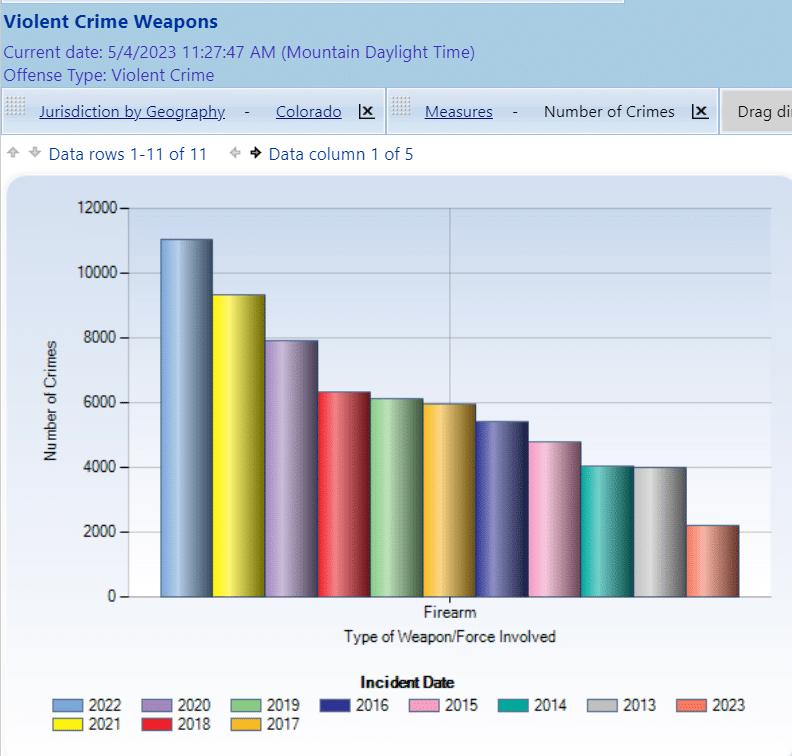
Gun-related suicides have not fared much better over the same period, though the most recent data made available by the Colorado Department of Public Health and Environment (CDPHE) only extends through 2021.
In 2013, 490 Coloradans committed suicide by firearm, according to CDPHE data. In 2021, that number was up to 740, and the total increased every year along the way, except for in 2017.
Adjusted for population, Colorado’s firearm suicide rate rose from 9.29 per 100,000 people in 2013 to 12.73 in 2021. Meanwhile, though Colorado’s non-firearm suicide rate has also gone up slightly since 2013, from a rate of 9.75 per 100,000 to 10.8 in 2021, it’s actually on a multi-year decline since 2019. That means that despite the passage of numerous gun-control laws at least partially aimed at suicide, more Coloradans are using guns to kill themselves each year, even as fewer are doing so using other means.
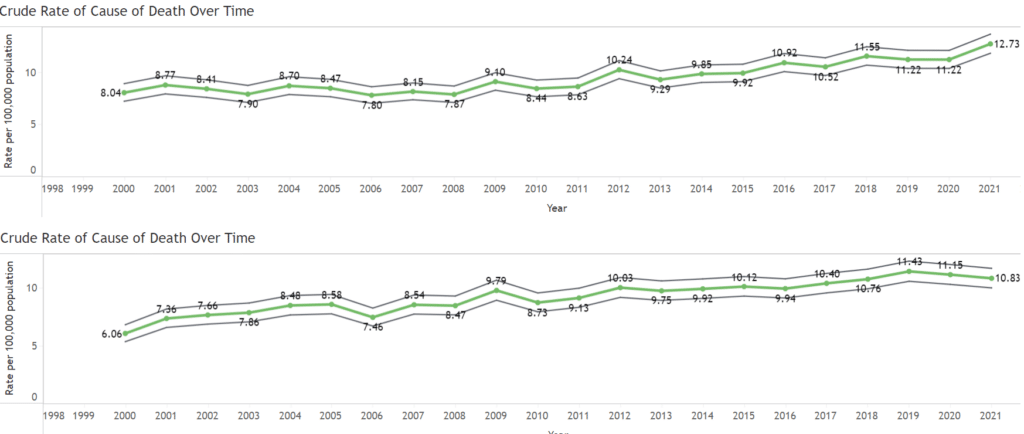
The state’s firearm homicide rate saw a similar trajectory over the same period, more than doubling from 2.01 per 100,000 people to 4.71 people from 2013-2021.
Comparison with Neighboring States
A common argument to explain why certain states with strict gun laws still have increases in gun crime is that surrounding states with lax laws undermine the efforts of restrictive states. Indeed, Colorado is bordered on all sides by states with less stringent laws.
Everytown ranks the gun laws of New Mexico, Nebraska, Utah, Kansas, and Wyoming at 16th, 22nd, 36th, 37th, and 44th in the nation in terms of strength. The group ranks Colorado’s laws as the 12th strongest.
Yet, despite this difference in gun laws, Colorado is firmly in the middle of the pack on gun-related homicide rates compared with its more lax neighbors, according to data from the Centers for Disease Control. While nearly all of the surrounding states have seen a similar upwards trajectory on gun homicides since 2013—except Nebraska, which has been statistically flat—Utah, Wyoming, and Nebraska all managed to have lower gun-related homicide rates despite maintaining, and in some cases loosening, their gun laws. Wyoming’s gun homicides were too low to graph reliably.
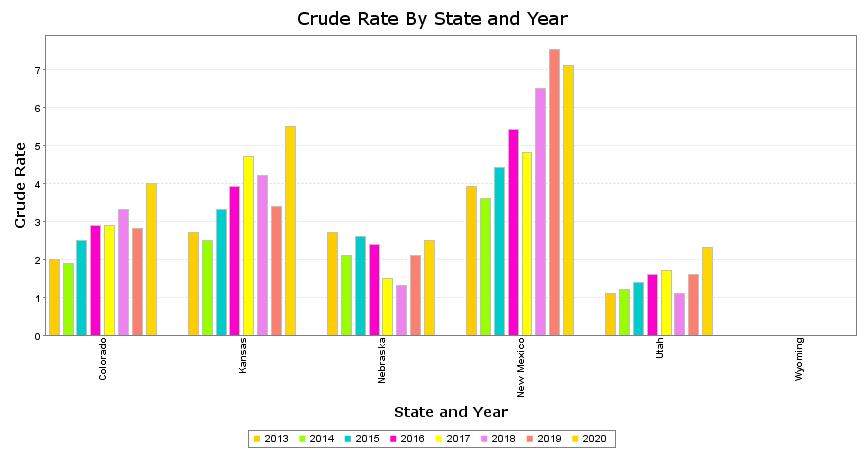
In terms of gun-related suicide rates, most of the surrounding states again saw increases since 2013 (except for Utah). But here, Colorado had a higher rate than its less-restrictive neighbors except for Wyoming and New Mexico, the latter of which has gun-control laws similar to those in Colorado.
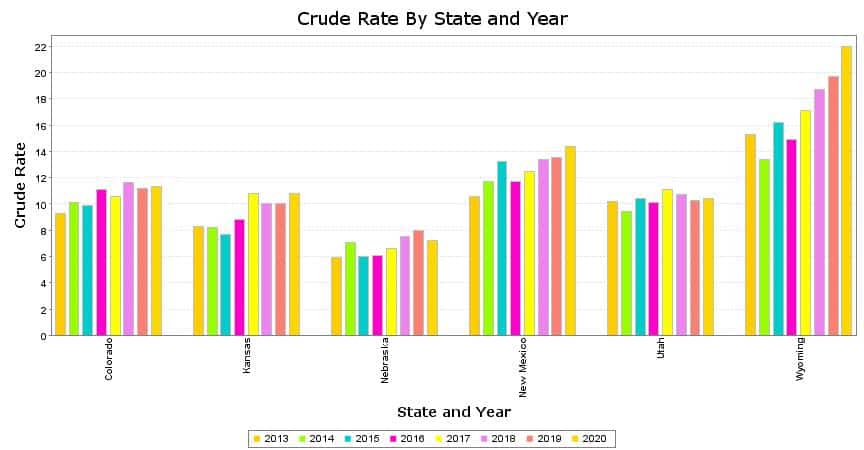
Mass Shootings
Mass shootings have been a particular focus in Colorado’s political debate over guns. Tragically, the state has experienced more than its fair share of such incidents over the years.
Good data on mass shooting incidents can be challenging to come by, given that researchers in this space have no uniform definition of mass shooting. Some counts, such as The Gun Violence Archive, don’t filter their data for crime-related events and include many events most Americans likely wouldn’t recognize as mass shootings. Other counts filter their data for incidents that are crime-related or don’t take place in public but disagree on where the cutoff should be regarding how many people were killed. They also vary on how far back their databases cover.
The Violence Project, which counts shootings where four or more victims are killed, dates back to 1966. Mother Jones, which counts shootings where three or more victims are killed, dates back to 1982. Both put Colorado near the top of their lists in terms of how frequently it has experienced mass shootings.
Mother Jones data shows Colorado has seen the fourth most mass shootings of any state. The count from The Violence Project shows Colorado has had the seventh-highest number of incidents and the third-most per capita.
But what about over the specific period in which gun control has been a significant state priority?
Mother Jones reports that since 2013, 598 Americans have been killed in mass shootings. Of those, 24 were killed in Colorado, meaning the state had roughly four percent of the nation’s mass shooting deaths over the same period despite only representing around 1.8 percent of the country’s population. Colorado, therefore, has had more than double the mass shooting deaths its share of the population would expect to see on average.
In terms of the frequency of such events, Colorado again has been unable to escape its overrepresentation among these horrific crimes in the Mother Jones count. The publication has tracked 80 mass shooting incidents since 2013, with five occurring in Colorado. That means Colorado was the site of 6.3% of all mass shootings since 2013, more than triple its share of the country’s population.
Since 2021 alone, The Violence Project has documented three high-profile mass public shootings in Colorado. Only California, a state with five times the population, has seen more mass shootings in that count over the same period.
Of course, it’s nearly impossible to evaluate the counterfactual. But for the passage of more than a dozen new gun restrictions, could Colorado’s increase in violent gun crime and its experience with frequent mass shootings have been worse? Different points of view will likely come to different conclusions.
But it’s clear a decade of new gun-control laws that have seen Colorado turn from a gun-friendly state to one with some of the strictest gun laws in the nation has failed to markedly arrest the trend of increasing violent crime, gun suicides, or the scourge of mass shootings.
That’s it for now.
I’ll talk to you all again soon.
Thanks,
Stephen Gutowski
Founder
The Reload







